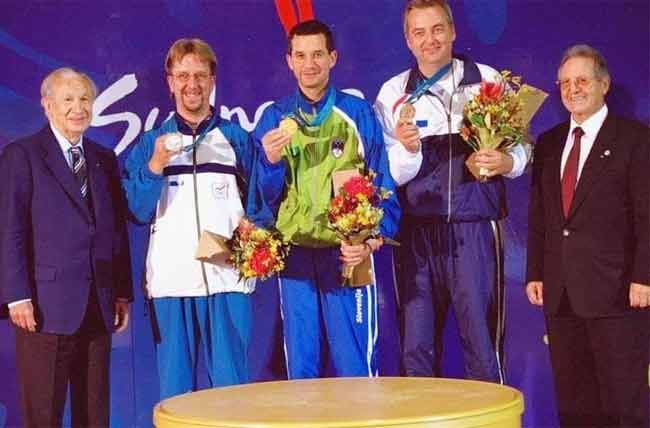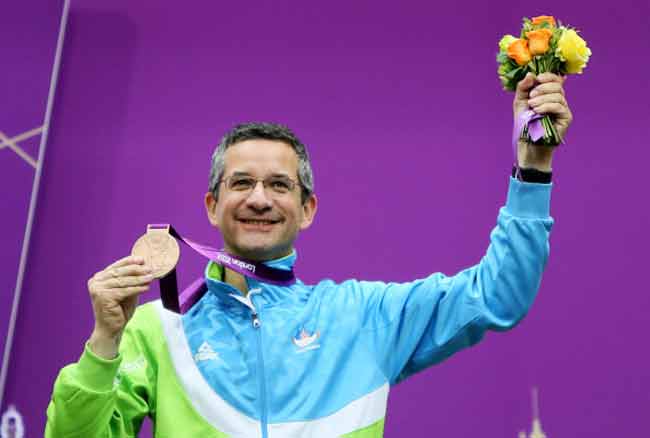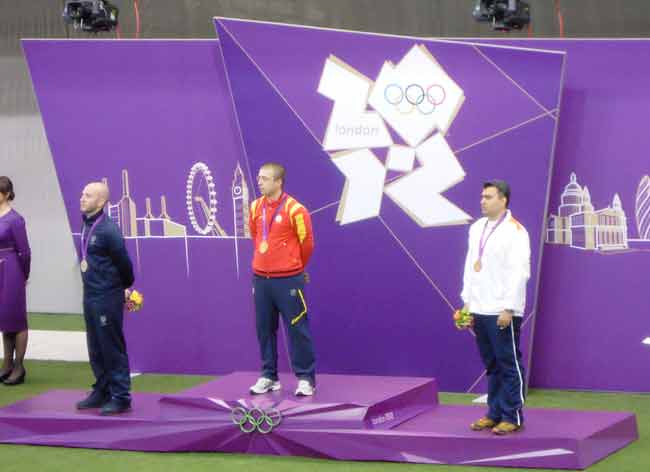NEW DELHI: We have all heard the saying ‘never give up’, but perhaps only a few can really do justice to that and persevere till they achieve their goals. One such individual is Slovanien shooter and three-time Olympic medallist Rajmond Debevec. Debevec’s shooting journey is a story of patience and perseverance. Debevec, now 57, participated in as many as eight Olympic Games and such was his determination and passion that he had to wait till his fifth Olympic appearance before tasting success on the biggest stage of them all.
Debevec represented Yugoslavia at the 1984 and 1988 Olympics and then after the breakup of Yugoslavia, he represented Slovenia in the 1992, 1996, 2000, 2004, 2008, and 2012 Olympics. His eight appearances means he is tied for third most Olympic appearances of all time.
Debevec didn’t have much to write home about in his first four Olympic appearances. But in his fifth appearance in the Sydney Games of 2000 he produced a brilliant show and won the gold medal in 50m Rifle 3 Positions. He shot a total of 1177 – 397 (Prone), 388 (Stand) and 392 (Kneel) in the final.

The 2004 Olympics saw Debevec finish fourth, missing the bronze by a whisker.
But he didn’t give up.
Debevec produced another medal-winning finish in the 2008 Olympics in Beijing where he won a bronze medal in the 50m Rifle 3 Positions. He shot a total of 1176.
His last Olympic appearance was in London 2012 where he shot a total of 596 in the 50m Rifle Prone to stand third on the podium once again.
Timesofindia.com caught up with the shooting legend for an exclusive interview to talk about his long Olympic journey, his camaraderie with Indian Olympic medal winner Gagan Narang and much more…
Excerpts:
You have won three Olympic medals – Gold (Sydney 2000), Bronze (Beijing 2008) and Bronze (2012 London). How would you sum up your Olympic journey?
Eight Olympics means a really long period of 32 years of sport shooting on the highest possible professional level. I dedicated my whole life to sport shooting and I do not regret even a single day
It was in your fifth Olympic appearance that you finally won your first medal (gold). The patience and perseverance shown by you was exemplary. What drove you forward towards your Olympic medal-winning dreams?
I actually represented my former country Yugoslavia at the first 2 Olympics in LA 1984 and Seoul 1988. A risk after declaring new independent country Slovenia to stay out of the Olympic family with serious possibility to miss the next Games in 1992 disappeared soon, while Slovenia was rapidly recognised as a new member of IOC. The new status to represent a new country motivated me, but it was also a heavy pressure while everybody in Slovenia was expecting first Olympic medals to be brought from Barcelona.
I had to grow up on the highest possible level also on the mental side, so at my fifth attempt I was finally awarded with a gold medal in Sydney 2000. Dream came true.

Would you say you are a perfect example of someone really following the saying ‘never give up’?
Perseverance is just another word for ‘never give up’ and this is the most important positive part of my mentality
What major differences did you notice, in terms of your performance, maturity and experience between your maiden Olympic Games in 1984 where you finished 20th in the 50 metre rifle 3 positions and 12th in the 10 metre air rifle and your Gold medal winning effort at the Sydney Olympics?
At my first Olympics in LA 1984, at age of 21, I followed just one of Pierre de Coubertin’s motto “the most important thing is to take part”. My ambitions, based on growth of technical level, maturity and experiences, became bigger at Seoul, but I failed to win a medal there and also on the next 2 attempts in Barcelona and Atlanta. Only then came my era, when I won 3 medals at the next 4 Olympics (missed a medal in Athens 2004 with 4th place).
India’s Gagan Narang and Sanjeev Rajput were also part of the 50 metre rifle 3 positions when you won the gold medal in the 2008 Olympics. Your take on how difficult it is to go up against ace shooters like them in the Olympics…
Sport shooting is an extremely individual sport – athletes are alone on the line and try to keep the highest level of concentration for the whole competition duration of more than 3 hours. There are probably at least 20 sport shooters on the line who all have top technical and tactical knowledge to win the match. A shooter actually fights himself or herself to make as few mistakes as possible while trying to shoot perfectly all 120 shots, plus the final. The one, who is mentally the strongest, becomes the winner that day.
You also participated in the 10m air rifle event in the 2008 Olympics. India’s Abhinav Bindra created history by becoming the first Indian individual Olympic gold medallist in those Games . Your take on how well he shot in those Games…
I followed Abhinav’s progress since he was a junior. Not many shooters know the story that I even once got a request from his father when we met at IWA fair in Nürnberg to coach his young talented son, but I’ve actually never seen myself as a coach, so I had to refuse the offer. Abhinav showed his brilliant talent and mental strength when he won a gold in Beijing and defeated all Chinese shooters on their territory. I can imagine what a historical moment for India this was. Later we both became members of the ISSF Athletes’ Committee, but our ways split – I resigned and still keep shooting, he quit active shooting and made a step towards sport politics, beside his business engagements, of course.

You (50 m rifle prone) and Gagan (10m Air Rifle) won bronze medals at the 2012 Olympics. Any special conversation that you had with Gagan after winning the medals in your respective categories?
I met Gagan long before the 2012 Olympics. I followed his progress and it was only a question of time when he would win an Olympic medal. We have similar sports personalities, so it isn’t a coincidence we became friends and we always share our experiences. I focused on the 50 m prone match in London and decided not to participate in the air rifle event which was Gagan’s strongest event. So, I had a privilege to watch that final when Gagan won bronze. It’s been 8 years already, so I could hardly remember details about (our) conversation, but I remember I met Gagan and his coach the next day in the Olympic Village dining hall and we sat together and talked for more than one hour.
You share a good camaraderie with Gagan. Any special moment or incident that you want to share with us?
Gagan accepted my invitation 3 years ago to join me at a training camp in my city Ljubljana. We had a great time not only shooting together but also travelling a bit, with sightseeing around Slovenia.
Source : timesofindia